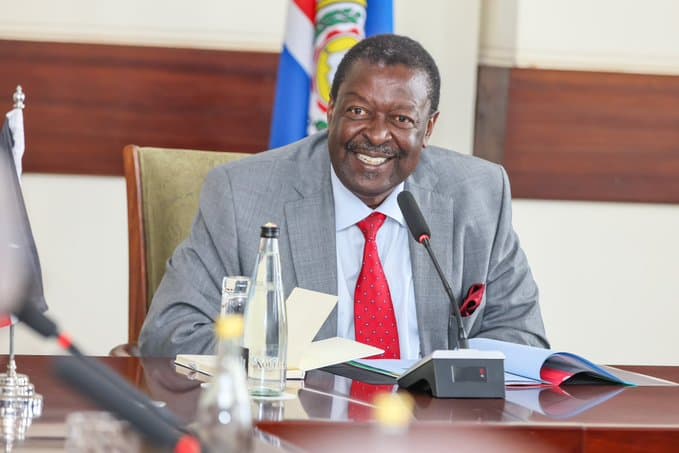We're loading the full news article for you. This includes the article content, images, author information, and related articles.
Nairobi, Kenya – Kenya has called for bold reforms at the United Nations, urging fairer representation of developing countries in global governance. Prime Cabinet Secretary Musalia Mudavadi made the appeal during the 49th Annual Meeting

Nairobi, Kenya — September 25, 2025 (EAT).
Kenya has urged bold reforms at the United Nations to give developing countries greater voice and representation in global decision-making, with Prime Cabinet Secretary Musalia Mudavadi warning that the current world order risks losing legitimacy unless equity and inclusivity are restored.
Speaking at the 49th Annual Meeting of the Group of 77 (G77) and China on the sidelines of the UN’s 80th anniversary in New York, Mudavadi said the UN Charter remained the cornerstone of multilateral cooperation but required urgent updating to reflect 21st-century realities.
“I underscored that the reforms we pursue, including the UN80 Initiative, should strengthen multilateralism, amplify the voice and representation of developing countries, and ensure greater equity in global governance,” Mudavadi said in a statement posted on X.
He noted that developing countries, despite accounting for most of the world’s population and bearing the brunt of climate change, poverty, and debt crises, remain underrepresented in institutions that shape global policy.
The G77 & China bloc represents over 130 developing countries coordinating positions on economic and development issues within the UN system.
UN80 Initiative: Launched to mark eight decades of the UN, it seeks reforms in peacekeeping, climate finance, and global economic governance.
Historic calls for reform: African leaders have for years demanded permanent African representation on the UN Security Council and greater voting power in Bretton Woods institutions like the IMF and World Bank.
UN Charter Principles: Adopted in 1945, it enshrines sovereign equality, peaceful dispute resolution, and promotion of human rights.
Reform mechanisms: Major UN reforms require support from two-thirds of the General Assembly and ratification by two-thirds of member states, including all permanent Security Council members — a high bar critics say entrenches the status quo.
Global South agenda: Developing nations want reforms in climate finance, debt relief, trade rules, and fairer representation in global governance bodies.
Kenya’s position: “The world has changed dramatically since 1945. It is time the UN evolved to serve all humanity, not just a few powerful nations,” Mudavadi told delegates.
G77 & China bloc: Members backed Kenya’s call, linking equitable governance to global peace and sustainable development.
Critics of current system: International NGOs argue the dominance of the five permanent Security Council members (P5) undermines legitimacy and fuels global inequality.
Population vs. power gap: Africa and Asia account for over 75% of the world’s population but have no permanent Security Council representation.
Economic disparity: Developing nations carry over 60% of global debt but hold less than 10% of IMF voting rights.
Climate finance deficit: The $100B annual climate finance pledge by developed nations remains largely unmet, hurting vulnerable countries.
Global stability: Failure to reform could erode trust in multilateral institutions, fueling unilateralism and regional blocs.
Economic justice: Developing nations warn they risk perpetual debt and climate vulnerability without fairer financial systems.
Geopolitical realignment: Rising powers in the Global South may bypass existing institutions if reforms stall, analysts say.
Whether the UN80 Initiative will gain support from permanent Security Council members.
If African Union proposals for two permanent African Security Council seats will pass.
How soon reforms could be enacted given procedural hurdles and geopolitical tensions.
1945: UN Charter adopted in San Francisco.
2005: African Union adopts Ezulwini Consensus demanding two permanent Security Council seats for Africa.
Sept 25, 2025: Kenya renews reform calls at UN80 sidelines via Mudavadi’s speech in New York.
Deliberations at the 2025 UN General Assembly on the UN80 Initiative.
Positions taken by P5 members on Security Council expansion.
G77 & China summit communiqués on reform priorities ahead of COP30 and WTO talks.
Keep the conversation in one place—threads here stay linked to the story and in the forums.
Sign in to start a discussion
Start a conversation about this story and keep it linked here.
Other hot threads
E-sports and Gaming Community in Kenya
Active 9 months ago
The Role of Technology in Modern Agriculture (AgriTech)
Active 9 months ago
Popular Recreational Activities Across Counties
Active 9 months ago
Investing in Youth Sports Development Programs
Active 9 months ago